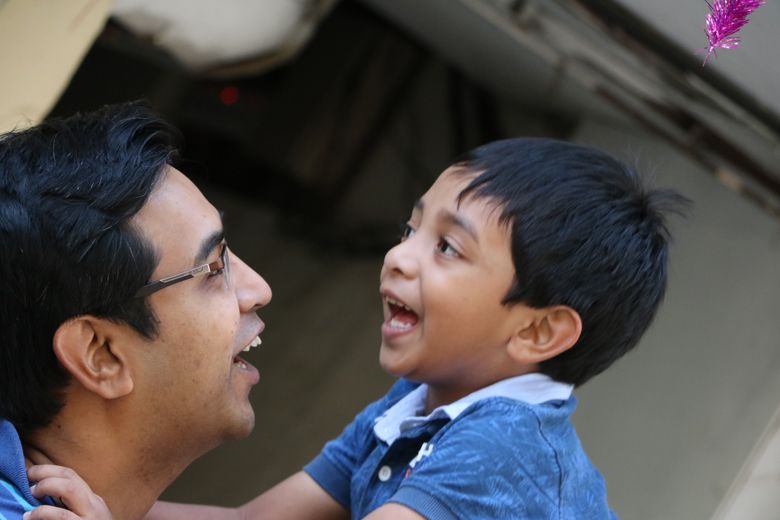Autism spectrum disorder cases are steadily on the rise globally, as most medical professionals will testify. Most advanced nations have already developed the medical intelligence and infrastructure to deal with this clinical condition. In India, unfortunately, awareness about it remains abysmally low till today.
Most parents do not know about ASD and ADHD. Or they may have heard about them in passing and often get stumped when their offspring is diagnosed with either.
The obvious challenge with ASD is the fact that there are no pathological tests available so far for the detection of the condition, and no two cases are exactly alike.
However, it does not mean that the basic process of confirmation of autism should be a harrowing and traumatic one for either the patient (usually a small child) or the parents.
In this blog, we tell you about parents’ experiences related to the process of diagnosis to detection of autism. The ones who spoke to us went through considerable confusion, discomfort, and shock as well at various stages of the journey while trying to confirm the clinical condition of their offspring.
In one case, by the time they received the news, they were so exhausted and shocked that it turned into a matter of concern for their little one – who while coping with her own disorder, also had to deal with traumatized parents and their discernible behavioural change.
Parents have narrated and shared their first-hand experiences here only to enable others in the same league to make better informed and confident decisions in their own journeys with an autistic child, a journey that is always full of learnings for both parents and the child along every step of the way.
Souravi Sinha’s story

Souravi, a senior HR professional with a multinational firm, shares the challenging process of bringing up her baby daughter from the initial years after her birth. Ashita, Souravi’s daughter, born in 2018, was a slightly premature baby who was also lactose intolerant and prone to infections of the urinary tract from the start. With her persistent health issues, she gave her parents sleepless nights. Within the first 3 months of her birth, she had UTI and prolonged diarrhea and was put on prophylactic antibiotics.
Apart from the investigations, consultations, and medications, the parents had to routinely take the infant for USG examinations to avoid any permanent damage to her kidneys. In October 2020, little Ashita suffered from a skin infection that aggravated her already compromised health condition. Her already agonized parents added dermatologists’ visits to their list of doctors. With timely intervention and correct medication, the little girl was thankfully cured of her skin condition.
In our culture, there is no end to the guilt that parents undergo when their child is detected with ASD. It could start oftentimes, with the misplaced idea of being negligent and casual during the mother’s pregnancy or child’s early infancy, and finally end with the notion of parents’ karma of another lifetime!
But their worries did not end there. Says Souravi,” Ever since her birth, we have remained engrossed, constantly attending to her immediate medical concerns and needs. We could not keep a look out for the usual developmental milestones. It was only towards the end of 2020 that we realized that Arhsita was not using words to communicate. She did maintain eye contact, but there was no inclination to use any words, leave alone sentences in her interactions with different family members. We sensed a poor response to external stimuli as well.”
The parents were beginning to panic as 2021 set in.
The previous year, 2020, had been a challenge for everyone, including Ashita’s family, as life turned topsy-turvy for all with the onslaught of COVID-19 and the ensuing lockdowns
Her parents somehow managed to take the child to an ENT specialist, puzzled by her behaviour and delayed speech. The doctor, not identifying any ENT issues, in turn, referred the child to a psychiatrist. Here, once again, they were referred by the specialist to a speech therapist, as it was felt that the problem area was her speech. As it turned out, this therapist worked only with adults and refused to treat a child! Therefore, they were, once more, referred to a speech therapist for only little children!
The complete process turned out to be an extremely nerve-wracking experience for the parents. On the one hand, they were venturing out frequently with their only child in a pandemic situation, and on the other, they were dealing with untold anxiety and worry for their offspring
Souravi stresses that the days were not just stressful in terms of physical and mental pressure, but also financial. Anyone who has dealt with specialists in a metro city knows that consultations do not come cheap.
Add to this, the lack of empathy they faced in most places. Receptionists and attendants are sadly poorly trained and have no patience or kindness to deal with parents – mostly young and inexperienced – who are themselves mostly worn out with tiredness, fear, confusion, and worry.
Souravi recalls the period of running around helplessly from one specialist to another with obvious indignation and regret and wishes that no one should face what she had to endure personally.
Finally, a Psychometric Evaluation Test was advised for Ashita by the second speech therapist who worked with small children. Thereafter, it emerged that the child was not on the spectrum but only a late developer, her developmental process delayed by 7 months. It was the proverbial ‘light at the end of the tunnel’ for the harassed and agonized parents.
That done, Souravi and her husband heaved a sigh of relief and are now determined to focus on the little one's balanced health issues. She vividly remembers and feels acute about the confusion, time, energy, and funds that were all part of the process to determine whether Ashita was on the spectrum. She believes that no parent should have to endure what she went through just to determine whether a child is autistic.
Souravi hopes that a more streamlined process of diagnosis and detection should be available at the earliest in all cities of India to ease the process for parents.
Sohini Sen & Sagnik Guha’s story

Modern, educated, and urban is how one would describe this couple who are both busy professionals. Sohini is the branch manager of a leading nationalized bank while Sagnik heads operations for a retail chain in Dhaka.
Listening in to how they discovered that their only child, nicknamed Gullu, is autistic and then life afterward is an experience by itself. It is a disturbing tale of how incorrect or inaccurate advice often leads family members to run from one center to another, and how the advice of assorted medical professionals, several of those who have scant time or sensitivity to the parents or families, may lead to a period of intense mental stress and agony for the parents.
At the same time, owing to our own unique culture of living with elderly parents, one may have to deal with them at home, those who are amply shocked to hear of any disorder in their beloved grandchild.
This leaves precious time and opportunity to address one’s own state of anxiety and depression as the realization of the child’s condition gradually sinks in.
It could happen in any household – yours or mine.
In this candid conversation, parents give clear and reasonable guidelines to follow, with a view toward making the journey less painful for others.
Gullu was born in May 2018. Her parents say that she was quite like any other child initially - happy, active, eager to learn and participate in everything. Early on, she also became inclined toward music and loved dancing to tunes for a year and a half.
However, beyond this, the parents noticed that she had lost interest in speaking to anyone. On closer observation, they realized that their apprehension was true. There was no speech development and little eye contact in the baby, then aged about 2 years.
Unfortunately, there was not much that could be done straight away, as this was in the latter half of 2020, when the country was ravaged by a pandemic. Physical consultations were mostly suspended owing to the national lockdown.
The parents spent sleepless nights, trying to fathom what was ailing their child and how to find a solution.
Once curbs eased, with no experience or know-how, they embarked on a sadly confusing process of tests and examinations based on recommendations from myriad specialists.
Between February to June 2021, they made innumerable trips to doctors’ chambers and diagnostics and opted for both physical and virtual consultations.
Finally, towards the end of July’21, could they conclusively ascertain that their child was autistic.
Since then, Sohini has intensified her attention toward the child. A finance professional, she was successful as a young branch manager. Now, she says, her career is secondary to Gullu’s wellbeing. She has consistently refused promotions as the child requires extra attention and specialists have stressed the importance of a parent taking on the role of the primary caregiver.
Sohini describes herself as the ‘bad cop’ in their parent-child relationship, whereas Sagnik assumes the role of the ‘good cop.’ With a mix of firmness, leniency, and kindness, she manages her little one with the intention of helping her become a confident, happy, and independent individual when she grows up.
In fact, she is currently on an unpaid, permissible sabbatical for up to 2 years (permitted to female employees only once in their entire career in her organization) from work to give complete attention to Gullu over the next two years.
“She needs to attend a variety of classes and examinations to ascertain her progress over the years, which are crucial to her physical and mental wellbeing. Moreover, at home we need to incorporate special regimens for her,” says the mother. “I would prefer to go through the entire process with her myself, rather than delegating it to someone else.”
Even though there may be grandparents in the household, most specialists believe that if a child is on the spectrum, a parent is best suited to take on the role of a primary caregiver.
The journey is a long and challenging one, that starts with finding the right set of specialists who have a proven track record in an ecosystem that is completely broken- the right specialist who can diagnose early, the right specialists who can work on the therapies to help the child understand and relate to everyday life and finally to work on the speech. Sohini and Sagnik have embarked on this journey and it took them close to 8 months of struggle on this.
For other parents in the same predicament, here are a few invaluable tips from the parents –- The news of your child being autistic can come as a big shock, quite capable of completely throwing you off balance. It may lead to a major emotional breakdown and affect your mental and physical wellbeing. Do not hesitate to reach out for expert help and counseling, so you emerge as a stronger individual, a parent well-equipped to deal with the situation.
- Use your immediate and extended sources to locate the right specialist. The importance of this cannot be emphasized enough. It is never possible to list dos and don’ts to select the correct specialist because each child’s case is unique. Connecting to the right set of professionals is the key. Keep monitoring the child’s progress every 2-3 months and look for a new professional to help you out if the progress is less than optimum.
- Be completely prepared to provide full-time attention to the child, at least at the beginning. This will call for major adjustments in your career and lifestyle. You must be willing to go the whole way for the sake of your little one.
- Be committed to constant monitoring.
- Focus on the process and remain attuned to the smallest of changes, both positive and negative. A timely intervention will ensure faster diagnosis and improvements. At the same time, a fine balance is essential between observation, action, and patience. At no point, does impatience help either you or your child.
- Quit comparing your child to any other. This may lead to unwanted frustration. Avoid it.
- Turn a deaf ear towards society’s myriad, non-medical noises. There may be well-meaning, non-medical individuals who will doubtless come forward to share their stories, life lessons, their own experiences, or offer advice and suggestions. It is best to avoid such advice. Which may or may not be relevant or helpful to your management process.
Did you find these real-time parents’ experiences and advice inspiring and useful? We hope to continue with the series, bringing to you true stories from parents in various locations across the globe.
Tags: Autism, Autism Spectrum Disorder, Autism in young children, Child with Autism, Health, Early detect.
DISCLAIMER:

